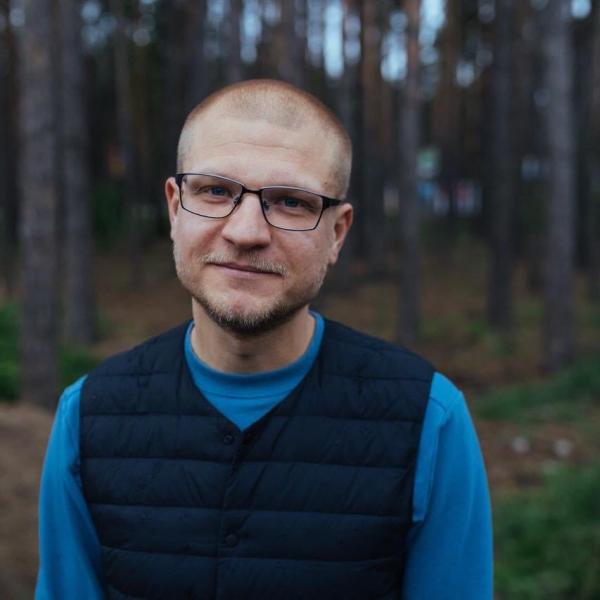
Oleksandr Mykhed is an Ukrainian author, considered one of the most influential of his generation, especially known in Ukraine for his novel Astra and his non-fiction book Ya zmishayu tvoyu krov iz vuhillyam (‘will mix your blood with coal’). Following the Russian invasion of Ukraine in February of last year, Mykhed has joined the Ukrainian reservists, and has dedicated his efforts as a writer to discussing the ‘language of war’, which he considers crucial to understanding and fighting a war in the information age. In particular, he argues that euphemistic or even neutral naming and presentation, as often used to describe conflicts, fails to place sufficient blame on Russia, even absolving those whom he considers culpable, namely the Russian people as a whole. Oleksandr believes that all of Russia is to blame, at least to some degree, for the invasion of his country, and wants Russia’s people as well as its government to face the judgement of the rest of the world.
We conducted an interview with Oleksandr via email, and this is what he had to say about the war, life since it began, and how, in his opinion, those outside Ukraine ought to speak about it.
Before the start of the war, did you think that a Russian invasion was possible?
The Russo-Ukrainian war has already been going on for nine years. The Russian terrorist state has been constantly carrying out a hybrid attack on life in our country. My wife and I prepared for the invasion, calculating the worst possibilities, but we couldn’t have imagined what Russia actually did. The war came to our doorstep on the 24th of February 2022 on the morning that Russian helicopters bombarded the airport in our small town of Hostomel near Kyiv. Russian troops brutally broke into houses belonging to our neighbours in Hostomel the very next morning. Such horror is hard to imagine, even though we’d all heard about Russian atrocities and the lies of their propaganda ever since 2014.
It was the same, for example, when Malaysia Airlines flight MH17 was downed over eastern Ukraine on 17th July 2014. All 283 passengers and 15 crew were killed. Russia has never admitted its guilt over what happened and is still trying to use propaganda to create a fake version of the truth.
In your opinion, the opinions of your family, and those of the people you know, whose fault is this war? Only Putin’s, or that of the Russian people as well?
I maintain the position that all of Russia is to blame for this war.
Even amongst Russian liberals, few opposed the annexation of Crimea in 2014. It’s funny now to rewatch the reporting on the supposedly opposition channel Dozhd from the state celebration marking the ‘reunification’ (more accurately the seizure) of Crimea. The reporter literally beams at the camera and can hardly hide his excitement.
It’s funny now to remember how, at the beginning of the invasion, many analysts genuinely expected protests to break out across Russia, and Putin’s totalitarian regime to topple. But none of this happened.
Instead, Russia’s aggression gained the support of over 70% of its population.
Some changes to the Russian people’s collective mind stirred when mass mobilisation began. But the protests and mass exodus from the country weren’t caused by Russia’s illegal aggression against Ukraine, but rather when their own deaths on the battlefield became a real possibility.
Mass brainwashing, dehumanisation of Ukrainians and other peoples, unhealed wounds of imperial resentment, a collapsing economy and value system, a generally skewed understanding of history, and a ‘ruscist’ (Russo-fascist) version of the events of the Second World War (so-called ‘victory mania’), and even the Moscow Patriarchate, which has openly supported the invasion of Ukraine – all of these are reasons why all Russians share the blame for the war.
After all, Putin didn’t personally commit the atrocities in Bucha and in Mariupol. Putin isn’t personally launching hundreds of rockets and drones every day to destroy our country’s infrastructure. Putin isn’t the sole justification for excluding Russian culture from the world’s intellectual platforms.
You’ve spoken often about the importance of the ‘language of war’. What would you most like people to change in the way they speak about the war in Ukraine, especially in Britain?
It’s not the “Ukrainian crisis”. It’s the Russo-Ukrainian war.
They aren’t “pro-Russian forces” in Donbass and it’s not the “Wagner private military company”. They’re Russian terrorists with state financing from the Russian Federation’s ministry of defence.
It’s not “denazification”. It’s the genocide of the Ukrainian people.
It’s not “Putin’s war”. It’s Russian aggression, for which every Russian is to blame.
This isn’t about journalists trying to adhere to conventional journalistic standards, showing “what the other side thinks”, and filming the funerals of mobilised Russian soldiers to elicit sympathy over their deaths. That isn’t the story. Not one of these Russians would have died had they not encroached on Ukrainian territory and supported the war.
After the war, how will Ukraine be different than it was before? Can Ukraine ever return to the way it was?
Already, Ukraine will be never be able to return to what it was before. Every day, we lose outstanding people, whose loss will be felt for the rest of our lives. Their memory gives us the strength to fight the ruscist, totalitarian regime that’s already been destroying our lives for nine years.